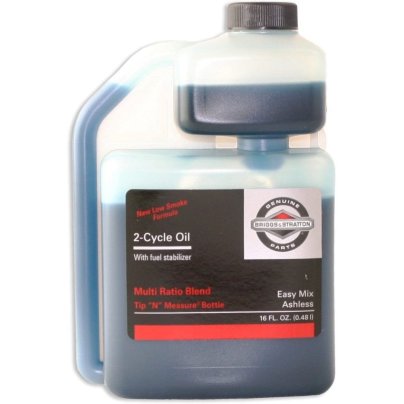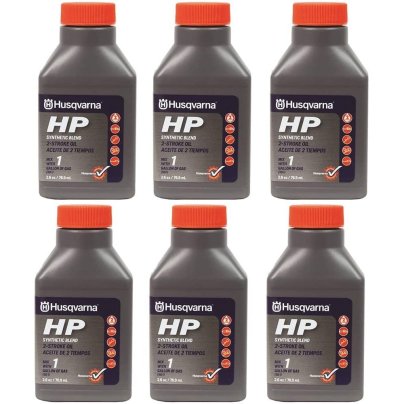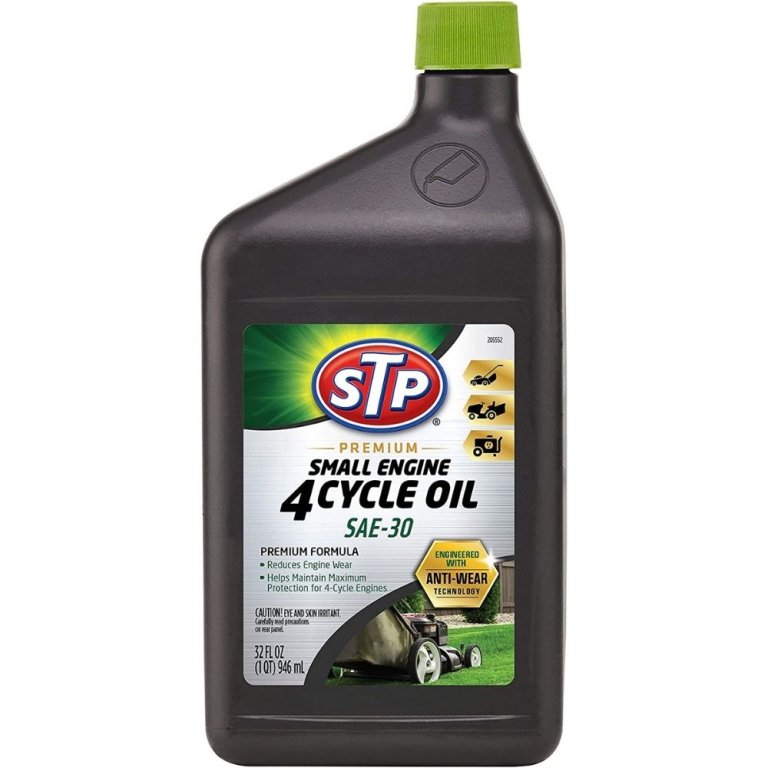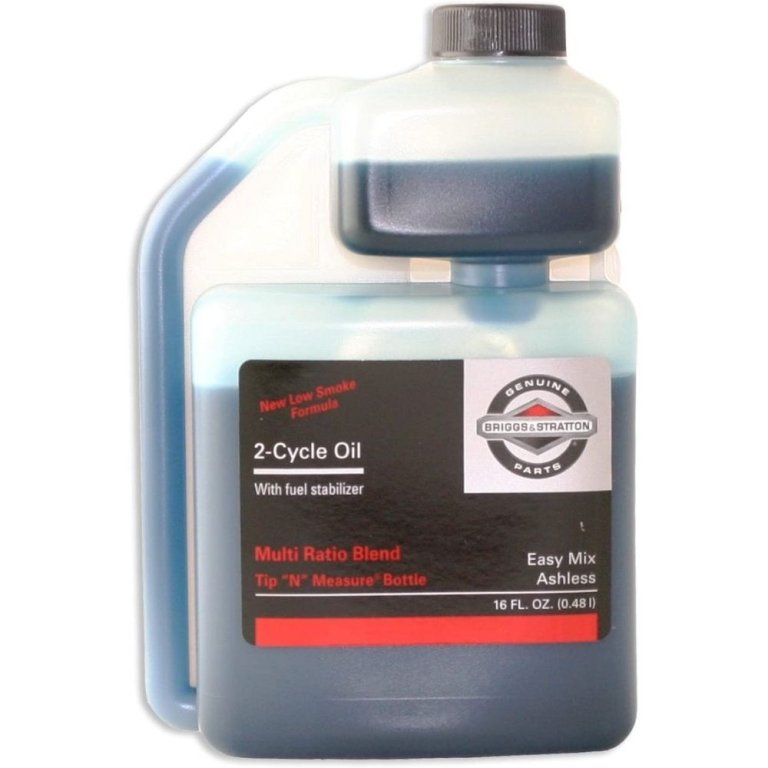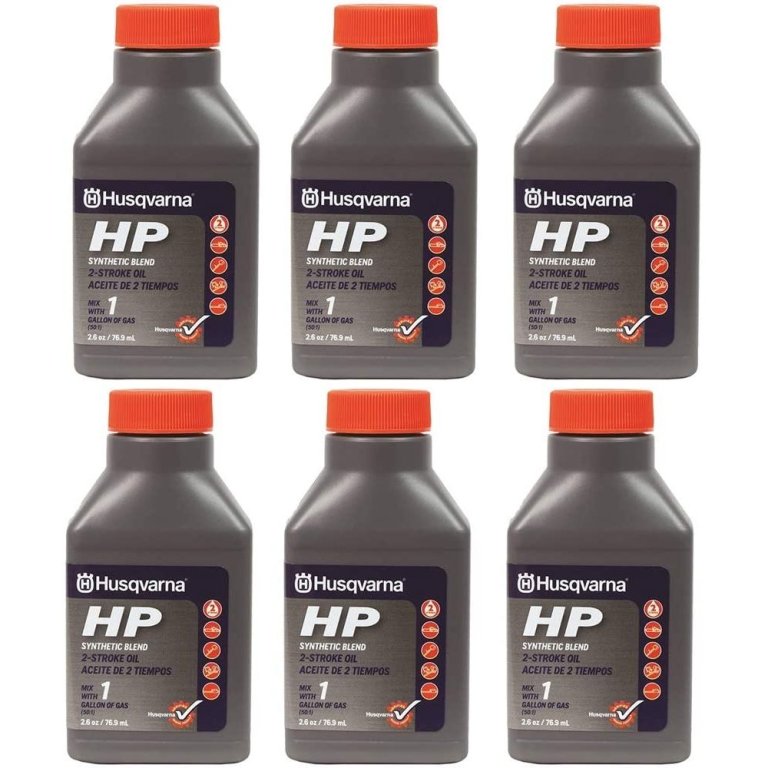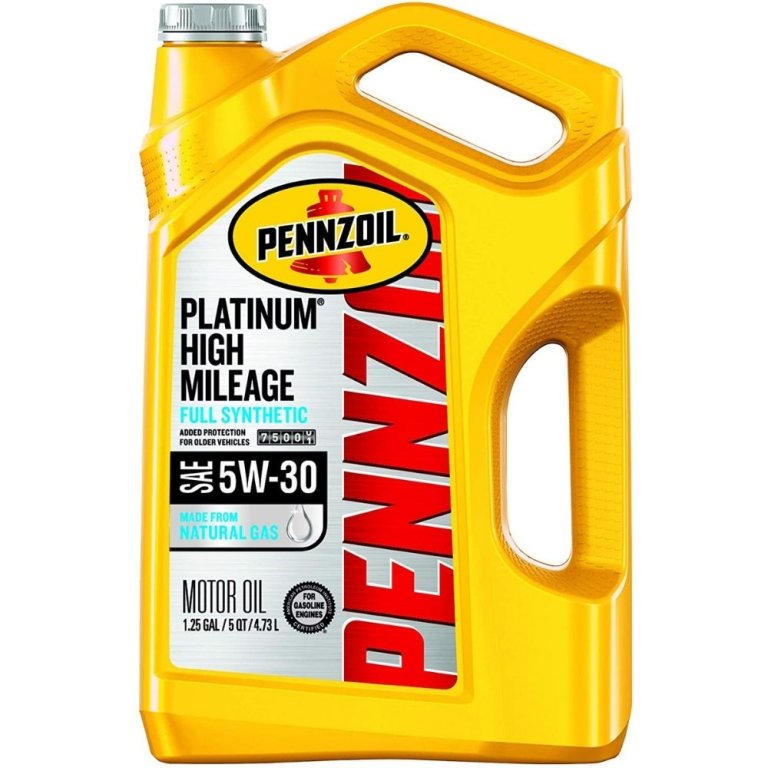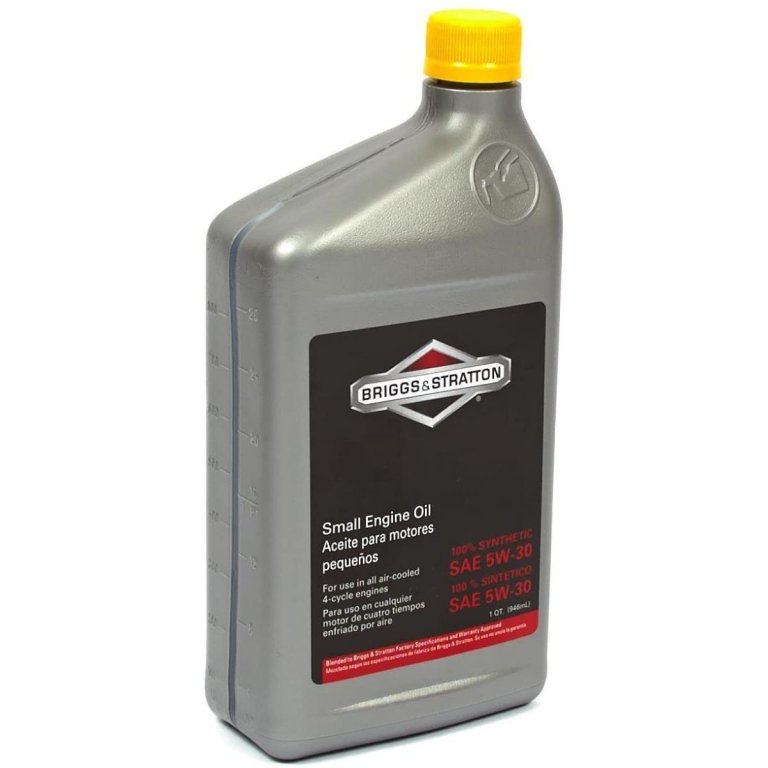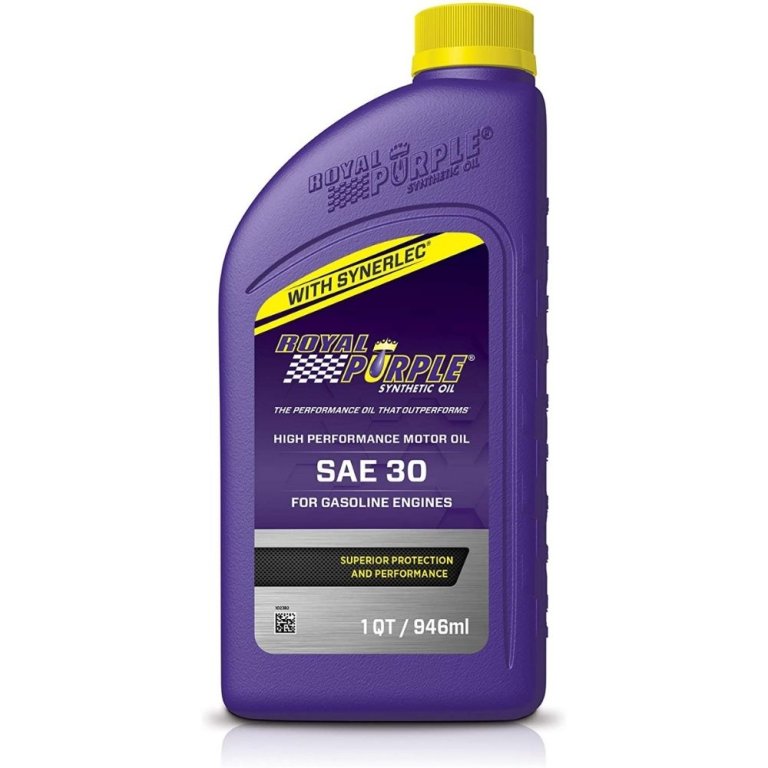
We may earn revenue from the products available on this page and participate in affiliate programs. Learn More ›
Whether you own a brand-new lawn mower or an older model, keeping it in peak condition requires periodic maintenance. Choosing the correct type of engine oil is a key part of the process and can make a huge difference in how smoothly the engine runs and how long the motor lasts.
With various technologies and compositions to consider, making that choice can be challenging. The following guide is designed to help you find the best oil for lawn mower performance and durability. It covers all machine types from modest walk-behind mowers to powerful ride-on models.
- BEST OVERALL: STP Premium Small Engine 4-Cycle Oil
- BEST BANG FOR THE BUCK: Briggs & Stratton 2-Cycle Engine Oil
- BEST 2-STROKE OIL: Husqvarna HP 2-Stroke Oil
- BEST FOR OLDER ENGINES: Pennzoil Platinum High Mileage Full Synthetic Oil
- BEST FOR COLDER TEMPS: Briggs & Stratton SAE 5W-30 Synthetic Engine Oil
- BEST FOR COMMERCIAL MOWERS: Royal Purple High Performance Synthetic Oil

How We Chose the Best Oils for Lawn Mowers
We researched the most sought-after oils for lawn mowers in their respective categories and discovered that the best options are determined by the type of oil, the viscosity, the quantity, and other special features included by top brands.
After extensive product research, we included a wide range of options in our list of top picks that were made with 2-stroke and 4-stroke formulas to accommodate multiple engine types, many of which come with detergents or corrosion inhibitors to reduce friction, carbon deposits, and rust. As for the viscosity, our top picks were selected to provide peak versatility with SAE-30 and 5W-30 options, making them ideal for small and large lawn mowers, tractors, garden equipment, snow removal machinery, and other vehicles.
Plus, we included options in our list of top picks that came with enough oil for multiple touch-ups or large-scale applications, ranging from 2.6-ounce options to a full 5 quarts of oil.
Our Top Picks
Now that we’ve gone over the technical aspects of the best oil for lawn-mower use, it’s time to look at some practical examples. Each of the following products come from a known and well-respected brand with a reputation for quality products. For rapid reference we have assigned each one an individual category.
Best Overall
STP Premium Small Engine 4-Cycle Oil
Pros
- Delivers all-weather performance; contains antioxidants that prevent thermal breakdown
- Integrated detergents reduce the buildup of carbon deposits; corrosion inhibitors prevent rust
- Suitable for a range of machinery including lawn mowers, tractors, and more
Cons
- SAE-30 viscosity is not as versatile as other options on the market
Product Specs
- Type: 4-stroke
- Viscosity: SAE-30
- Quantity: 32 ounces
STP’s synthetic SAE-30 4-cycle oil is designed to offer maximum lubrication in small motors typically found in lawn mowers and lawn tractors. While technically only a single-grade oil, the synthetic element gives it all-weather performance comparable with multigrades.
The formulation contains antioxidants that prevent thermal breakdown, or the deterioration of the oil at high outdoor temperatures. It has detergents that reduce the buildup of harmful carbon deposits and a corrosion inhibitor that helps prevent rust and damage when the machine is stored outside the mowing season.
STP 4 Cycle Oil is a great all-rounder that suits a wide range of machines and the majority of mowing conditions. It comes in a convenient 32-ounce bottle and is a competitively priced synthetic lawn motor oil.
Get the STP oil for lawn mowers at Amazon or Walmart.
Best Bang for the Buck
Briggs & Stratton 2-Cycle Engine Oil
Pros
- Ashless formula contains a fuel stabilizer for complete combustion and limited smoke
- Can be mixed with gasoline if desired; can create a 50:1 ratio
- Measuring section included on the top of the bottle for ease of use
- Comes with ample quantity for large-scale or multiple uses
Cons
- No viscosity listed on manufacturer site; may not be ideal for some users’ needs
Product Specs
- Type: 2-stroke
- Viscosity: Unlisted
- Quantity: 16 ounces
Briggs & Stratton is the world’s largest producer of engines for outdoor equipment and as such has unrivaled experience producing motor oil for lawn mowers and lawn tractors.
The company’s conventional 2-stroke oil is a low-smoke “ashless” formula. It contains a fuel stabilizer that ensures almost complete combustion of the mix. The result is that the spark plug isn’t fouled by unburned oil and the engine runs more evenly and cleanly.
Briggs & Stratton 2-stroke oil comes with two 16-ounce bottles and can be mixed with gasoline at a 50:1 ratio. To make things easier, there’s a convenient measuring section built into the top. This is a popular product at a very competitive price.
What our tester says: Mark Wolfe, a Bob Vila commerce writer, notes about this oil for lawn mowers, “I like several things about Briggs & Stratton 2-cycle oil. First, it comes in a “dosing” bottle. I squeeze the bottle to dispense into the upper reservoir the precise amount to mix with 1 gallon of gas for either a 40:1 or 50:1 fuel/oil ratio. No need for a separate measuring device. Second, it already has fuel stabilizer blended in, which eliminates another product purchase and another mixing step, since I would have added fuel stabilizer to my 2-cycle mixed gas anyway. Also, this blend really does seem to produce less visible exhaust smoke when I use it in my chainsaw, leaf blower, and weed whacker, compared with cheap off-brand 2-cycle oils.”
Get the Briggs & Stratton 2-cycle oil for lawn mowers at Amazon.
Best 2-stroke Oil
Husqvarna HP 2-Stroke Oil
Pros
- Made with detergents and fuel stabilizers for reducing smoke and harmful emissions
- Comes with ample quantity for multiple uses or large machinery
- Reliable brand for long-term use and peace of mind
Cons
- Some users have reported shipment issues or poor packaging
Product Specs
- Type: 2-stroke
- Viscosity: Unlisted
- Quantity: 2.6 ounces (per bottle)
The HP 2-stroke oil comes from Husqvarna, one of Europe’s leading manufacturers of powered garden equipment. It’s designed to cool and protect 2-stroke motors, which typically run at much higher revs and are considerably hotter than their 4-stroke counterparts.
This oil is a semi-synthetic blend and offers many of the performance advantages of full synthetics—but it’s blended with conventional oil for economy. It contains detergents to keep the engine running cleanly and a fuel stabilizer to reduce unburned gases, minimize smoking, and reduce harmful emissions.
HP SYNTH comes as a six-pack of 2.6-ounce bottles. It’s intended for a 50:1 mix, and each small bottle is sufficient for 1 gallon of gasoline.
Get the Husqvarna oil for lawn mowers at Amazon.
Pennzoil Platinum High Mileage Full Synthetic Oil
Pros
- Excellent choice for older engines as well as high-mileage road vehicles
- Natural gas–based formula minimized both friction and noise when in use
- Made with detergents for reducing carbon deposits and wear on engines
Cons
- No type listed; may not have the stroke capacity that some users require
Product Specs
- Type: Unlisted
- Viscosity: 5W-30
- Quantity: 5 quarts
Pennzoil Platinum is a synthetic 5W-30 motor oil primarily designed for use in high-mileage road vehicles. However, those same properties also make it appropriate for older lawn-mower engines that are showing signs of wear.
If an engine starts to get noisy the natural inclination is to use thicker oil to keep it quiet, but this “solution” only masks the problem. Pennzoil Platinum is a patented natural gas–based formula that minimizes friction and doesn’t burn off in worn engines like some petroleum-based alternatives. It also contains detergents to reduce carbon deposits that cause additional friction.
Because it’s intended for vehicle engines, Pennzoil Platinum comes in a larger 5-quart bottle. While the initial cost is higher than many lawn-mower oils, it’s nothing compared to the extended life it can provide.
Get the Pennzoil oil for lawn mowers at Amazon, The Home Depot, Walmart, or Target (1 quart).
Briggs & Stratton SAE 5W-30 Synthetic Engine Oil
Pros
- Perfect for use on lawn mowers as well as snow removal equipment; keeps up performance in up to -20 degrees Fahrenheit to 100 degrees Fahrenheit
- Low-viscosity formula is thin enough to maintain lubrication while allowing for movement
- Made with detergents to reduce carbon deposits; reduces friction and overheating
Cons
- Some users have reported poor packaging and leaking
Product Specs
- Type: 4-stroke
- Viscosity: 5W-30
- Quantity: 32 ounces
Briggs & Stratton’s 4-stroke SAE 5W-30 oil is a fully synthetic multigrade that many argue is the optimum weight for all outdoor power equipment. While this oil is recommended for the brand’s own mowers, it can be used in any air-cooled, 4-stroke motor.
The 5W low-viscosity element makes it an excellent choice for cooler climates where it flows freely and maintains lubrication. The 30-weight component ensures a good all-around performance in all conditions. In fact, the oil remains efficient in a range of temperatures anywhere from -20 degrees Fahrenheit to 100 degrees Fahrenheit. It also contains detergents to reduce deposits that cause increased friction and can lead to overheating.
Briggs & Stratton SAE 5W-30 comes in a 32-ounce bottle. For a synthetic lawn-mower oil it’s remarkably good value for the price.
What our tester says: Mark Wolfe, a Bob Vila commerce writer, notes the following about this oil: “I use Briggs & Stratton 5W-30 synthetic small engine oil in my portable generator and my lawn tractor through winter for easier starting in cold temperatures. The full synthetic oil works well in all temperatures but seems to make cold weather starting go smoother, with fewer pulls on the recoil cord and a shorter runtime in the choke position. I have also noticed less sludge at oil change time compared to SAE 30 oils.”
Get the Briggs & Stratton SAE 5W-30 oil for lawn mowers at Amazon.
Pros
- Formula is designed for heavy-duty use on commercial mowers, machinery, garden equipment, and vehicles; can be used with diesel engines
- Provides reduced wear and emissions, increased efficiency, and corrosion protection
- Comes in multiple sizes depending on the amount of oil needed
Cons
- No polar additives included in the formula; may not be ideal for use in colder temperatures
Product Specs
- Type: 4-stroke
- Viscosity: SAE-30
- Quantity: 1 quart
Royal Purple’s SAE-30 4-stroke oil is a high-performance synthetic single-grade designed to maintain efficient lubrication and cooling in motors under consistent heavy load: the kind of conditions commercial lawn mowers often need to endure. It can also be used in diesel engines.
The complex formula offers reduced wear, corrosion protection, and increased efficiency with fuels that contain ethanol. It can improve low-speed firing, helps minimize emissions, and is claimed to reduce fuel consumption.
Royal Purple 4-stroke oil comes in various sizes from 1 quart to 5 gallons, allowing commercial mower owners to make the most economical choice for their equipment size.
Get the Royal Purple oil for lawn mowers at Amazon.
Jump to Our Top Picks
What to Consider When Choosing Oil for Your Lawn Mower
Lawn-mower oil can be categorized as either 4-stroke or 2-stroke (or 4-cycle and 2-cycle). The engines themselves operate quite differently, and the two oil types are in no way interchangeable. Mower oil has a number of variables that impact its suitability for different machines; each variable is discussed in the following section.
Type
Small, lightweight engines like those fitted to chainsaws and gas-powered weed whackers typically use 2-stroke oil, as do a number of smaller lawn mowers. The oil is mixed with the gasoline and burns away during operation. The wrong mix causes poor firing, smoking, overheating and, in the worst cases, engine seizure.
Four-stroke oil is found on larger and generally more durable lawn-mower engines, ranging from medium-size walk-behind models to commercial ride-on models. The oil is poured into the crankcase much like the oil in road vehicles is and should be changed periodically (usually once a year).
Both 4-stroke and 2-stroke oils can be either conventional (also called regular) or synthetic. Conventional lawn-mower oil is made from crude oil, whereas synthetic oil is more refined and blended with other chemicals. Synthetic oil offers superior lubrication for high-performance motors, but it’s almost invariably more expensive, and many lawn-mower engines don’t run fast or hot enough to warrant the additional cost. That said, the quantities involved are modest, so some owners choose to use synthetic oil anyway.
Viscosity
Viscosity or “oil weight” is a term used to describe the thickness of lawn-mower oil. These numbers were established by the Society of Automotive Engineers, and so oils bear the initials SAE. The acronym of SAE-30, for example, is a popular lawn-mower oil.
Oil generally becomes thinner as it gets hotter, so low viscosity (thinner) oils work better at low temperatures and high viscosity oils work better at high temperatures.
However, single-grade types, like the SAE-30 mentioned above, have limited flexibility. The solution: multigrades. A 10W-30 oil is a common example. The “W” represents the low- temperature weight, the other number is the high-temperature weight. Such an oil offers good performance at a range of temperatures; thus multigrades offer a better all-around solution. However, while this can make a big difference to owners of road vehicles, they offer minimal benefit in areas where the temperature during the mowing season remains moderately warm or hot. As a result, single-grade lawn mower oils remain popular.
Additives and Detergents
Modern lawn-mower oils can be highly engineered lubricants with variations tuned to particular performance aspects. Additives generally focus on protecting engine components from excess wear. They may also be designed to optimize performance in older engines.
Detergents help stop the buildup of sludge and other deposits to reduce wear. They’re generally more effective in commercial mower engines that tend to run hot after extended periods of use.
The precise content of these oils, however, is a closely guarded secret. Beyond trusting the reputation of a particular brand, it’s virtually impossible to verify each manufacturer’s claims.
Eco-Friendliness
All lawn-mower oils are derived from fossil fuels, so their eco-friendliness is subjective. Oils made from natural gas are the cleanest burning, but at present something of a rarity. However, there are a couple of things that have an impact on the environmental aspects of these products.
Two-stroke engines tend to produce higher emissions than their 4-stroke counterparts. The California Air Resources Board (CARB) and the U.S. Environmental Protection Agency (EPA) limit the use of lawn mowers and other engines that don’t comply with certain standards. Some manufacturers have responded by making their 2-stroke engines less polluting, and several comply with CARB and EPA restrictions. In general, 4-stroke motors are more environmentally friendly.
Synthetic lawn-mower oil may last longer and produce fewer emissions than conventional oils. It could be argued that if oil needs to be changed less often, then less harm is being done. However, this needs to be weighed against the more intense refining process. Any gains are modest, and there’s little practical difference.
It’s important to dispose of used oil properly. It should never be poured down the drain, and in most areas it’s illegal to do so. An increasing number of towns and cities offer curbside collection, or users can search the Earth911 website for the nearest recycling center.
FAQs
The information above should have left you better informed about how to choose the best oil for lawn-mower maintenance. While important technical and performance issues were covered, there are a few practical considerations that may raise questions. Here are a few answers to the most common questions about lawn-mower oil.
Q. How often should the oil be changed?
Two-stroke oil changes constantly because it’s mixed with the gasoline, so there’s no need to worry with that type of mower. Four-stroke mowers need more regular attention, and there is a useful article on maintenance here. It suggests keeping an eye on oil level and topping up periodically. A full change is usually only necessary once per season or for small mowers every 50 hours. For riding mowers, an oil change every 100 hours is recommended.
Q. How do I change the oil in the lawn mower?
Instructions will be provided with your new mower and should be followed carefully. Generally there’s a drain plug in the crankcase which is removed, and the old oil is collected in a tray or a pan. Tipping the mower will help ensure it’s empty. Larger mowers may have an oil filter that needs to be replaced. Once that’s done, replace the drain plug and fill with the required quantity of new oil.
Q. How much oil should I use for a lawn mower?
The manufacturer will recommend the quantity, and it’s important to be as accurate as possible. Overfilling can cause as much harm as underfilling. Using a plastic measuring jug is a good idea. Small mowers take anywhere from 15 to 24 ounces of oil, while riding mowers will need 48 to 64 ounces.
Q. Is there any difference between a 4-cycle oil and a regular one?
“Regular oil” is usually a term associated with those made from crude oil rather than synthetics. Both 4-cycle and 2-cycle oils come in either form. The information above should help you decide which is best for your lawn mower.
Q. Can I use my motor vehicle engine oil in my lawn mower?
Often you can use motor oil on large ride-on mowers and older machines. It’s important to check manufacturer recommendations. For walk-behind models, it’s usually better to use small engine lawn-mower oils which are specifically formulated for the performance of these types of motors.
Q. What happens if I don’t change my lawn-mower oil?
Dirt and carbon will accumulate in the oil, causing a higher wear rate of engine components. The oil itself will degrade and the engine will overheat, which can result in engine failure or it may dramatically shorten the life of the mower.

